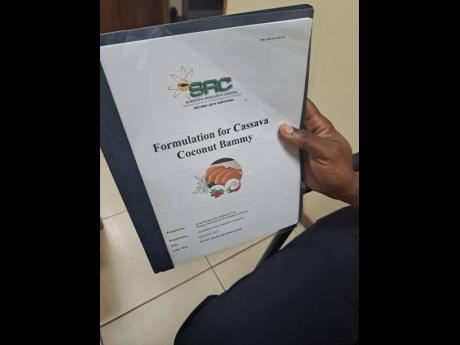Hunt for factory space frustrates bammy producer
WESTERN BUREAU:
Lenworth Fulton, president of the Jamaica Agricultural Society (JAS), has called on the government to improve land availability for aspiring agricultural entrepreneurs.
Fulton’s appeal follows the ongoing struggles of Nadesha Campbell, a farmer from St James, who has faced numerous obstacles in her quest to establish a bammy factory. Despite her efforts, Campbell has encountered significant challenges, exacerbated by what she perceives as a lack of support from various land-management agencies.
“I have developed a ready-to-eat coconut bammy, and I am seeking a trademark for it. I needed factory space, and I wasn’t getting through with that,” Campbell recounted.
“It was recommended to me that processing should start for the bammies, and that I start by seeking floor space for lease. I could not identify a space, so I went to the Factories Corporation of Jamaica, but they had no floor area available for lease.”
She shifted her focus to acquiring land for the construction of a factory. Her search extended to St James, Hanover, and Trelawny, where she faced additional challenges. In Hanover, she encountered issues with inadequate water supply, limited electricity access, and high transportation costs for raw materials. In Trelawny, the property she identified was privately owned and also posed a costly transportation issue.
Eventually, Campbell identified a potentially ideal plot in Montpelier, St James, near to the Montpelier Agricultural Showground. She wrote to Minister of Agriculture and Mining, Floyd Green, seeking assistance in establishing a bammy factory at the location. Green, in a letter dated December 11, 2023, said representatives of the ministry visited the site and had no objection to the proposed development. He, however, said “adequate land tenure due diligence” was needed and that “minimal building footprint” results from any construction.
Green also referred Campbell to the National Land Agency (NLA) to help answer the question of land tenure. However, she was informed by the agency that access cannot be granted to the land.
“The applicant identified the property of interest, and after investigation by the NLA she was advised in February 2024 that said property is not available for divestment,” marketing and public relations manager Nicole Hayles told The Sunday Gleaner.
“The JAS is in possession of the property and has been so for over 40 years,” Hayles added.
Glendon Harris, president of the Jamaica Agricultural Society’s St James branch, said the organisation has a 99-year lease on the property.
Meanwhile, Fulton said the government should formulate policies to assist farmers and entrepreneurs like Campbell.
“The whole issue of land distribution is one of the worst points to deal with. What is the Government’s plan to give land to these farmers, including livestock, and to give to people like Nadesha Campbell who wants to build a factory? It is rubbish, and they need to be exposed for it,” Fulton stressed.
He added: “I do think that the NLA, which the land falls under, could give her a piece, but not part of what we occupy. I would like to encourage her to continue to seek land to build her factory, but that is the most I can do.”
In the meantime, Campbell is pondering her next move. She told The Sunday Gleaner that she is depending on grant funding to assist in taking her product to the world.
“I cannot apply for grant funding without a legal tenure. They don’t know how much it will cost to construct the factory because I don’t have a legal tenure and the master plan is not yet drawn,” said Campbell.
“I have to be paying fees for trademark and property rights, and all of this without earning anything. I just want to try,” she said.
Agro-processing has long been advanced as a critical plank of Jamaica’s economic growth prospects. Prime Minister Andrew Holness, in 2019, said the secret to rapid economic growth is to create more value in local agriculture.
Earlier this year, in February, Shanique Edwards, acting manager in charge of agri-business exports at Jamaica Promotions Corporation (JAMPRO), urged Jamaicans to tap into the high demand for items such as canned ackee, breadfruit, mango, yam, cassava and sweet potato in the overseas market.
“The diaspora represents a sizeable market base of over 1.1 million members in the United States, over 800,000 in the United Kingdom, and more than 309,000 diaspora members in Canada. You can also consider targeting sub-markets that are aligned [to the tourism industry] in some cities in these countries,” she pointed out.
Despite the importance of agro-processing, the Development Bank of Jamaica (DBJ) said there was no loan uptake for the agro-processing last year. According to the Economic and Social Survey Jamaica 2023, the last time the DBJ provided agro-processing loans for food processing was 2021 when $300 million was loaned.


